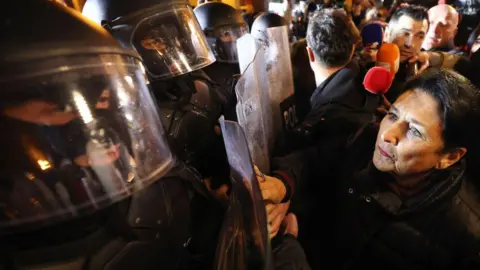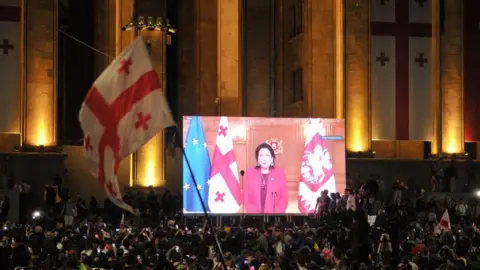
 Getty Images
Getty ImagesSalome Zurabishvili's family fled Georgia in 1921 after Soviet forces crushed the country's three-year attempt at independence from Russia.
A century later, the pro-Western president of Georgia refuses to leave office, claiming that she is the last legitimate institution in her country.
Her six-year term as president is scheduled to end on Sunday. Under a new system for selecting the head of state, she will be replaced on that day by former Manchester City footballer Mikhail Kavelashvili, who was chosen with the support of the ruling Georgian Dream party.
Zurabishvili (72 years old) denounced his election under the electoral college system in which he was the only candidate, describing it as a farce.
When she became president in 2018, she was endorsed by the Georgian Dream party, but has since condemned their disputed election victory in late October as a “Russian special operation” and supported nightly pro-EU protests outside parliament.
The government says that if she refuses to leave office, she will commit a crime.
If she is forced to step down, she says the ruling party's control of the country will be complete and Georgia will have handed over its sovereignty to a party she accuses of serving Moscow.
“Legendary place”
Salome Zurabishvili was born in France in 1952 to a prominent Georgian immigrant family. Her grandfather, who had been a minister in the government of briefly independent Georgia, fled to France in 1921.
Georgia, then under Soviet rule, loomed large in her childhood. She said in a 2004 interview that it was “a legendary place, which only exists in books.”
Although she grew up culturally Georgian, speaking the language at home and attending Georgian Orthodox church services, she assimilated easily into French culture. She attended elite schools in France, including Sciences Po, traditionally a feeder school for the country's top public servants.
She has excelled as a French diplomat for nearly 30 years. But all the while, her true passion remained to rid her parents' mysterious home country of Russian influence and bring it closer to the West.
“She considers it her life’s mission to bring Georgia to Europe,” said Alexander Krivo-Asatiani, a former aide to Zurabishvili. “Everything else for her has always been secondary.”
In 2003, she was appointed Ambassador of France to Georgia. A year later, she obtained Georgian citizenship and was appointed Minister of Foreign Affairs under President Mikheil Saakashvili. She was dismissed in 2005, and took an increasingly prominent role in the politics of her adopted country, founding a new party.
Saakashvili's rule ended in 2012, and Georgian Dream has remained in power ever since. Georgians consider the party's founder, billionaire Bidzina Ivanishvili, the most powerful man in their country. Coincidentally, he is also French, having obtained citizenship in 2010.
Backed by Ivanishvili's party for the presidency, Zurabishvili was initially not very popular among the country's pro-Western youth. A popular TV show made fun of her halting Georgian, which she speaks with a strong French accent.
 Getty Images
Getty ImagesIt was seen as allied with the ruling party, which is unpopular with many young people, and blamed the brief war with Russia in 2008 on allowing Georgia to be provoked.
But as her presidential term progressed, the Georgian Dream took an increasingly authoritarian and anti-Western turn, suppressing civil society and NGOs. It has refused to join Western sanctions imposed on Russia after the massive invasion of Ukraine, and has described the West as a “global war party,” making a mockery of its stated goal of joining the European Union and NATO.
Zurabishvili openly challenged the government, believing she had the support of the majority of Georgia's population.
She vowed to veto a draft law on “foreign influence” that mirrored Russian legislation passed under President Vladimir Putin, but the government passed it anyway, defying weeks of protests.
“The choice for Georgia is between independence or slavery, Europe or Russia,” she said in April.
She often addressed the protesters who turned out every night for a month outside Parliament, calling them the conscience of the nation against the Russia-friendly government.
Last month, riot police, whom the opposition accuses of brutalizing protesters, asked: “Are you serving Russia or Georgia?”
Many protesters, who initially distrusted the president for coming to power on the back of the Georgian Dream, came to respect her outspoken opposition.
“No one expected it to be this good,” said Irakli, 34, who demonstrated regularly. “It reflects our values.” “It motivates us to fight.”
Before the disputed elections in October, the government tried to impeach her for meeting with European Union leaders without government permission. Ultimately, the efforts failed, but it was a sign of the coming confrontation.
Zurabishvili described the elections that returned the Georgian Dream to power as “completely fraudulent.” It supported opposition parties' calls for a rerun of the elections, which angered senior party leaders.
“Let's see where it ends up.”
It may now face its biggest challenge yet, as the Georgian Dream Company prepares to inaugurate its replacement, Mikheil Kavelashvili, as president of the country.
But Zurabishvili insisted she would not leave, which could lead to a potential constitutional crisis. The Prime Minister of the Georgian Dream, Irakli Kobakhidze, threatened her with arrest.
“Let's see where it ends up, behind bars or outside,” he told reporters this week.
Peter Tsiskarishvili of the opposition United National Movement said the government was likely to force her to leave one way or another.
Recognizing that she did not want to be made a political martyr and raise her profile further, he added, he might avoid a high-level arrest, perhaps even banning her from her official residence at the Orbeliani Palace.
Doubts towards her will continue. Some opposition members blame her for presenting a pro-European face to the authoritarian transformation of the Georgian dream for too long, refraining from criticizing Ivanishvili until only a few months ago.
But in a country where pro-European forces have often been divided, Zurabishvili's supporters say she is likely to emerge from her term as the government's main opponent.
“Even if she is arrested, she will still be considered the legitimate president of Georgia. There is no doubt about that,” said Krivo Asatiani, a former aide to the president.







